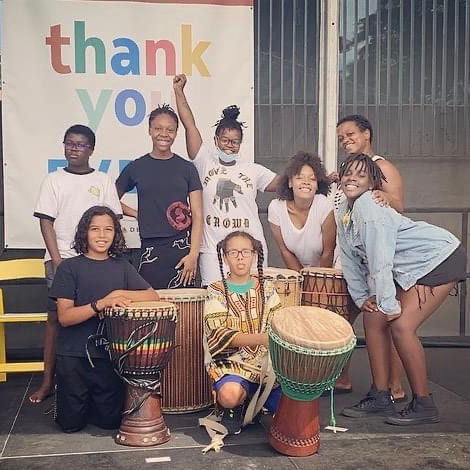Kenna-Camara Cottman: “Blackness has everything in it”
Kenna-Camara Cottman’s eyes light up when talking about three things; family, art, and the Northside. Kenna grew up immersed in the arts, thanks to parents “Auntie” Beverly and Bill Cottman.
“I learned about being an educator and being a storyteller, being a drummer, and a dancer, and all those things – visual art – from my mom,” said Kenna. “I learned how to be a writer and make images, and then photographs and poetry, just ways of knowing – different cosmic ways of knowing – and Afrofuturism and all types of stuff from my dad.”
Despite growing up in South Minneapolis, Kenna attended and graduated from North High School, where Beverly was a teacher. Kenna graduated from North High in 1992, and eventually moved to North Minneapolis after giving birth to eldest child Yonci. Going to school at North High made it possible for Kenna to build connections with the people and community around it, and cherishes places like North Commons Park and Juxtaposition Arts.
The Voice
For Kenna, being Black and an educator is not separate from being an artist – they’re all a part of one identity. Kenna identifies with the role of griot, a West African historian and storyteller. “Cultural artist” is another way of putting it.
“The way I see it is like, transmitting knowledge and information is a part of being a griot, an oral historian, a storyteller, a teacher, a creative person, a dancer, like a choreographer, like those things are about ways of knowing when you know something, and then I transmit it to others. And then I receive information. Being an “educator” is a word that doesn’t fit because I’m learning and I’m telling what I know – I’m sharing. I’m growing, you’re growing, we’re all changing. So that’s kind of how I see it. And then the art is just part of it.”
Kenna says it’s important to highlight Black happiness over Black trauma. While trauma should be acknowledged and processed, Kenna finds it hurtful when it’s the only experience mentioned because “Blackness is not trauma.” Instead, Kenna focuses on “the core of my Blackness:” drumming, rhythm, and movement.
“Blackness encompasses a lot of things,” said Kenna. “And so I’m happy to work with folks that are feeling people are trying to kick them out of the Blackness, like my trans homies, like whatever the identity that is marginalized within Blackness, that other Black people are trying to gate-keep. Nah, I’m like, actually, Blackness has everything in it.”
Making space for being Black and Black joy is a part of Kenna’s art and work with VOICE of Culture. Created in 2008, VOICE of Culture puts a Black American twist on West African rhythms and movements and then shares them with the community.
“I made VOICE of Culture, a Black space for Black people to do Black things for Black liberation, because we gotta get free of the white gaze to even just practice.” Kenna remembers attending an African dance conference that had a large number of white people in attendance. “The number of people that were consuming me while I was at that, and I’m like, I’m just here trying to learn and connect with these other African-based people.”

Earlier this year, Kenna was a part of a rhythm and grooves class with Brother Ghana Mbaye over at North Commons. Parents who had taken classes with Brother Ghana when they were younger brought their own children to the class. What Kenna thought was going to be a simple drum class became a class taught by these parents to their children.
“You can’t actually put into words how the layers of generations, and then how the artistry is intertwined in the culture of Blackness, and it all overlaps and intersects, to create the north side arts community, which again, is like a language for something that is felt in lives.”
Kenna is the curator of the FLOW Northside Art Crawl, and works to find buildings, parks, and other locations for the different activities and art showcases. Since this art crawl is held in different parts of North Minneapolis, the process has led Kenna to notice how many resources and spaces aren’t fully accessible to the community. Even using a public place like a park sometimes requires jumping through hoops.
“If there’s a resource, and everyone’s trying to get a hold of it, but for some reason, I’m able to get through and let everybody else in – then I’m doing it. I’m known for that.”
Kenna passionately talks about working with other community members and the connections they have. “Shout out to Cameron Downey, who’s an artist younger than me – one of my younger mentors – we’re gonna do an activation at this one site over North called Northside Epicenter. So shout out to Anissa Keyes, because that’s my older mentor who has this building & we’re about to create this amazing healing space in North Minneapolis.” It’s evident that this community and the art that comes from it are important to Kenna.
The Future
Kenna was selected for the 2021-2022 Creative Economy Fellowship. As an abolitionist, Kenna is frustrated with the hold capitalism has on communities and organizations, especially nonprofits in Minneapolis. Kenna says that it’s hard to understand how these organizations continue to function normally whenever someone is killed.
“I’m very concerned with folks using community and continuing to use some of our people – to martyrize people that have been killed to prop up going to work. Basically, just punching in and punching out and doing a bunch of emails.”
Although frustrating to deal with, Kenna tries to not let the negativity take over.
“I’m trying to not worry and just do what I can do. I’m looking at some pictures right now of my uncle Richard, again, ancestral plane. And he will say, just do what you can do. You can’t do everything, just do what you can do.”
In the future, Kenna hopes to get into pottery and do more work around radio and DJing. With Yonci as the DJ of the family, Kenna’s son is trying to “figure it out” too. Kenna just wishes for him to be happy.
“I hope I can just support people with what they want to do. And always let people know that I support them. Because I don’t care what you do, I support you, I just love you, my people, my children, my younger mentors, my older mentors, the people that are reckless. And so I hope I just continue to figure out who those people are, that are really rocking with me, and I’m rocking with you.”
About the author: Faaya Adem is an Oromo American student journalist based in the Twin Cities who is passionate about uplifting diverse and marginalized communities through storytelling. Her work has appeared in the Star Tribune and Pioneer Press.

